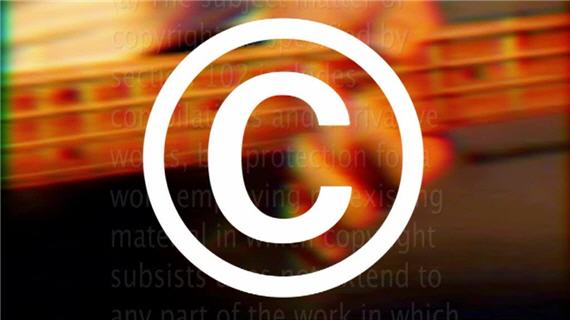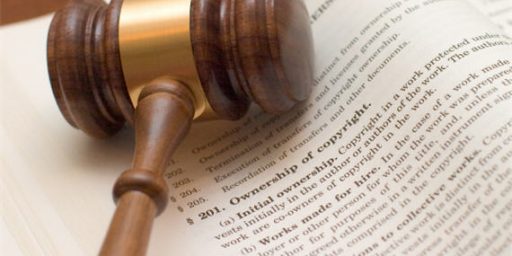Viacom: YouTube Ruling ‘Completely Destroys’ Copyright
Viacom says a lower court ruling in favor of Google "would radically transform the functioning of the copyright system and severely impair, if not completely destroy, the value of many copyrighted creations."
In an appeal filed yesterday, Viacom said a lower court ruling “would radically transform the functioning of the copyright system and severely impair, if not completely destroy, the value of many copyrighted creations.” David Kravets for Wired:
Viacom, on behalf of its MTV, Comedy Central, Black Entertainment Television, Paramount Pictures and Nickelodeon units, is seeking to overturn a June ruling that, if it survives, is a boon for internet freedom — and a decision that would make it more difficult for rights holders to protect their works. The media concern told the New York-based 2nd U.S. Circuit Court of Appeals on Friday that, if the lower decision stands, “it would radically transform the functioning of the copyright system and severely impair, if not completely destroy, (.pdf) the value of many copyrighted creations.”
The June 23 decision at issue by U.S. District Judge Louis L. Stanton of New York said internet companies, even if they know they are hosting infringing material, are immune from copyright liability if they promptly remove works at a rights holder’s request — under what is known as a takedown notice.
Stanton disagreed with Viacom’s claims that YouTube had lost the so-called “safe harbor” protection of the DMCA. Viacom maintains Google does not qualify, because internal records showed Google was well aware its video-hosting site was riddled with infringing material posted by its users. Stanton ruled that YouTube’s “mere knowledge” of infringing activity “is not enough.” “To let knowledge of a generalized practice of infringement in the industry, or of a proclivity of users to post infringing materials, impose responsibility on service providers to discover which of their users’ postings infringe a copyright would contravene the structure and operation of the DMCA,” the judge wrote.
Stanton ruled that YouTube, which Google purchased in 2006 for $1.8 billion, had no way of knowing whether a video was licensed by the owner, was a “fair use” of the material “or even whether its copyright owner or licensee objects to its posting.”
Techdirt’s Mike Masnick calls Viacom’s claims “insane hyperbole” and “hogwash.”
First of all, it’s exactly how the system has functioned since the DMCA came into being in 1998. If you see infringing content on a site, you issue a takedown and the site takes it down in order to keep its safe harbors. The idea that it would “completely destroy” the value of content makes no sense at all. First, you have to understand why it makes no sense that YouTube should be liable: it has absolutely no way of knowing, for certain, whether or not specific content is infringing. As it showed in the case, even Viacom itself had trouble figuring out what was infringing, and had sued YouTube over a bunch of videos that it had put on YouTube itself. How do you make YouTube responsible for determining such things when even the copyright holder can’t figure it out? It makes no sense.
Second, the idea that the value of the work is “destroyed” again makes no sense. After all, the value of any particular content is intrinsic to the content and how any individual feels about it. The value of a piece of content doesn’t change if someone puts it up on YouTube. Furthermore, YouTube quickly does remove content when it receives a takedown notice, so if Viacom is that concerned, it can send the takedowns. In fact, that’s exactly what it did and the company complied. That’s exactly what the law says it should do. On top of that, nothing in the DMCA’s safe harbors immunizes those who actually upload the content, who are still very much liable for their own actions.
But the biggest evidence that Viacom’s claims are complete and total hogwash is the simple fact that even after the ruling, there has been no “mass destruction” in value of content. As we’ve pointed out for years, the overall revenue for the entertainment industry continues to go up all this time — though, perhaps less of it goes to the gatekeepers like Viacom. But those are normal market changes, not anything nefarious.
Masnick is right when he says this is “exactly how the system has functioned since the DMCA came into being in 1998.” But that just means Viacom doesn’t have much of a case, not that they don’t have a legitimate complaint.
As a site owner for going on eight years, it’s clear that DMCA is seriously flawed — in both directions.
On the one hand, as Kravets notes, “The law demands intermediaries such as YouTube to take down content in response to a notice from rights holders, without evaluating the claim for reasonableness or accuracy, or considering the fair use rights of users.” Effectively, this means that small sites without deep pockets, such as OTB, are at the mercy of the whims of DMCA filers. The mere claim of copyright infringement — no matter how absurd — forces site owners to remove the content until they get a ruling that they’re not infringing copyright. Not only does this destroy the value of the material for a news-driven site but, for all intents and purposes, it’s the end of the matter since fighting it is more trouble than it’s worth unless you’ve got lawyers on retainer.
On the other hand, as Viacom’s case demonstrates, DMCA’s protections for copyright holders is weak. While filing a takedown notice itself is relatively straightforward — albeit time consuming — it’s only useful in the case of a specific infringement. “I certify that the materials at this [specific URL] are mine and that I own the copyright.” It’s all but worthless in the case of YouTube, which is serially stealing Viacom’s content. If Google has no responsibility to police its content, its millions of users can put up Viacom’s videos faster than Viacom can issue takedowns. It’s not at all hyperbolic to say that this “radically[s] transform the functioning of the copyright system and severely impair[s], if not completely destroy[s], the value of many copyrighted creations.”
In the case of OTB, as with most other blogs with any audience to speak of, there are content scrapers which simply steal all of the content from the site and republish it as their own. For reasons known only to Google, these sites often wind up ranked higher in the search engines than the original. It’s a problem that seems to defy solution. For small operators, simply finding out who owns the site and who to send the DMCA takedown notice to can be cumbersome. And having to figure out every single instance of the theft is virtually impossible. And, again, all it does is require the removal of the content at those URLs; there’s no protection against further theft by that operator. Further, a goodly number of the scraper sites are housed on overseas servers and not subject to the DMCA, anyway.
I haven’t the foggiest idea what the solution to all this is. The fact that the entertainment industry is making record profits doesn’t justify stealing their property in order to enrich Google — which after all is doing okay, too. Large operations like Google, especially, should have a duty to prevent infringement. Given that their business model relies on professionally produced materials, the likely result will be Google paying Viacom and other content creators a licensing fee rather than the public’s being deprived on easy access to the content.
At the same time, there has to be better protection for Fair Use rights. Ripping the latest Metallica video to YouTube isn’t protected. A mashup of the same video for parody purposes is. And some yahoo performing his own version of the song, while technically an infringement, should be allowed as well. How one balances these competing interests isn’t clear.







” If Google has no responsibility to police its content, its millions of users can put up Viacom’s videos faster than Viacom can issue takedowns. ”
But isn’t that really Google’s problem: There’s a million (billion?) points of entry to YouTube. Difficult to see how Google can vet each and every entry for copyright without spending gazillions of dollars in the effort, as long as there’s free-for-all posting allowed. Maybe they could set up some kind of licensing procedure that would allow postings from only trusted IP addresses or some such, where “trusted’ means “has not in the past posted copyrighted material.” Would something like that work?
It may not damage copyright but it probably does serious damage to Viacom’s business plan. I gather that what Viacom wants to do is have Google do Viacom’s work for it, then sue them for damages if they fail.
I think that open hosting plus takedown grants the most freedom, and ultimately respects the rights of the creator. It just takes some time, depending on the implementation strategy and investment, to grind through the takedown.
That’s a price you pay for freedom.
I mean, think about how else it could work … you’d have to make every content site something like iTunes, with heavy front-end screening on each upload. It would be in incredible bottleneck. My nephew’s school animation project wouldn’t appear same-day, let alone same-month. And of course, with that much content screening someone would have to pay.
Three cheers fo the copyright downfall.
(It is simple technologically to detect straight clips from a known source. It is computationally intensive though. With current tech Google or Viacom would need a server farm grinding away, comparing new uploads to recent television shows. It could be done though, especially if you narrow the problem to “this week’s shows.”)
Sam : Most people have dynamic IPs assigned to them by their ISP which means you would be netting a lot of innocents. Meanwhile the “criminals” in this equation would find it easy to get around any IP filter by using a proxy server..
James, this is not meant as an attack, just a question: Your site frequently posts very lengthy excerpts from an article. There is a link, but rather than just have a few lines to give the nut of the argument, I’ve seen what must be 70-80% of the whole article. And in the Short Takes section, this may be proceeded by a single sentence from the poster. As a writer yourself, aren’t you concerned this is stretching the meaning of “fair use”?
It is really interesting, MarkedMan, not just how fair use becomes a frontier, but also how “All Rights Reserved” is interpreted in a distributed network. Many copies are made of each RSS and source article. That’s just the way it works.
The way to implement All Rights Reserved is to put up a firewall and block access to your own site 😉
@sam
That strikes me as reasonable.
@Dave
Presumably, Viacom wants the right to control and get paid for the distribution of content it owns. That’s not unreasonable.
@john p
The problem is that it allows rampant theft and puts the onus on the owner to stop repeat offenders such as Google on a constant basis. The problem is that YouTube bills itself as a place for amateur video such as your nephew’s project when, in reality, its business model is posting copyrighted material.
@MarkedMan
I’ve worried about stretching “Fair Use” and, indeed, almost certainly do it with the artwork. In the main, we’re in the spirit of the doctrine — excerpting and then transforming with value added commentary. But some of the breaking news stuff is borderline. But I’ve gotten maybe four or five legitimate complaints in nearly eight years and something like 50,000 postings.
This was my (albeit snap) interpretation as well.
Such sites aren’t covered by the DMCA safe harbor anyways. It only applies to content submitted by users, not content put up by the site itself.
I have my 13 year-old file DMCA take-down notices for me. I believe he charges $5.
Perhaps we search for different things?
Try searching for “trangia stove” and look at all the amateur how-to’s and reviews. Or try searching for “royal wulff” and look at all the self-less internet age instruction.
No, I think the pronouncement that YouTube is about the copyrighted material is BS.
@Matt
“Sam : Most people have dynamic IPs assigned to them by their ISP which means you would be netting a lot of innocents”
Aren’t those folks, for the most part, using dialup? DSL and Cable users have dedicated IP addresses, if I’m not mistaken (I know I do). Hard to imagine someone uploading a YouTube via dialup. Possible, I guess, but unlikely.
@Michael Reynolds: “I have my 13 year-old file DMCA take-down notices for me. I believe he charges $5.”
Presumably, people are posting either entire novels or chapters or somesuch one time? In the case of blogs, there are scrapers which basically publish the content of several sites creating a “new” blog of their own with said content. Finding, say, all the OTB postings is a giant pain.
@Stormy: “Such sites aren’t covered by the DMCA safe harbor anyways. It only applies to content submitted by users, not content put up by the site itself.”
Right. But their ISP is covered by safe harbor and it’s the ISP to whom one serves the takedown notice.
James:
Yeah, that’s only when I find someone posting an entire book. I would never go after someone for excerpts or fanfics or parodies or whatever. The economics are very different in your situation — even if you had your own 13 year-old. (Get the daughter working on her web skills. What is she, like 3? Time to get her a job.)
Sam : No most dsl and cable are dynamic granted it’s not changed as often as dial up but it still changes (usually at set intervals or when hard booting your modem). Usually you have to pay extra to get a static IP. Still doesn’t change the fact that IP bans are so easy to bypass that a child could do it while legal users would still be banned for no apparent reason..
Ah, OK. Didn’t know that, but then I’ve not had occasion to reboot the modem nor, to tell the truth, have I checked to see if the IP address has in fact changed. As for the last, point taken (privoxy, I guess, etc.)
Nope. Most DSL and Cable subscribers are behind NAT such that large numbers of users appear to the rest of the internet to be using the same IP. This is going to become increasingly common with the exhaustion of the IPV4 address space making individual IPs more and more costly.
This is why I despise the rent-seeking system that is the DMCA. Even legitimate uses of copyright material – like video parodies on Youtube – would end up being taken down because the copyright holder filed a complaint. It’s also a convenient tool of legal intimidation, as you mentioned.
You are correct that a lot of places put you behind a NAT. I don’t have numbers but I haven’t been behind a NAT while having an internet connection in three major cities but I was behind a NAT with one service (which sucked ugh)..
I don’t think there is an easy answer to this, although i don’t think Google is responsible for vetting every post made to youtube. Seems like while the law isn’t perfect, for now it may be the best thing we have.
I also think sites like youtube actually may increase exposure for some content and may increase sales (although this is probably more in regards to the smaller companies with small marketing budgets-Viacom probably doesn’t need help from youtube to market its content).
This ruling will have positive and negative implication. I’m convinced that a lot of people can get away with this without being caught. Good luck with the implementation of this new act!